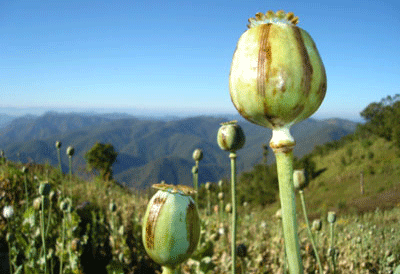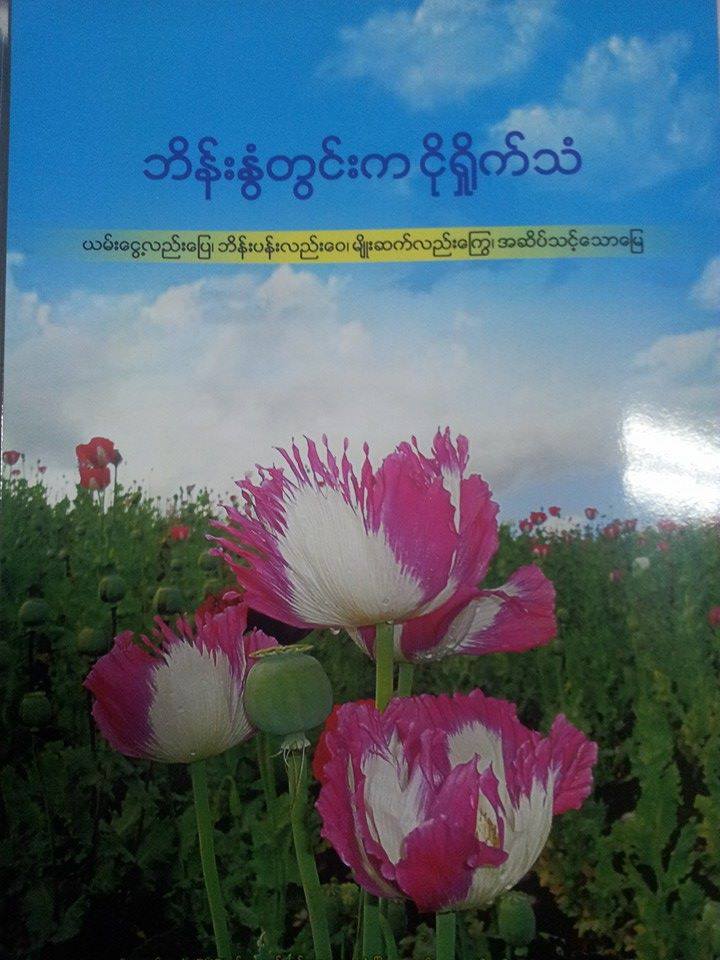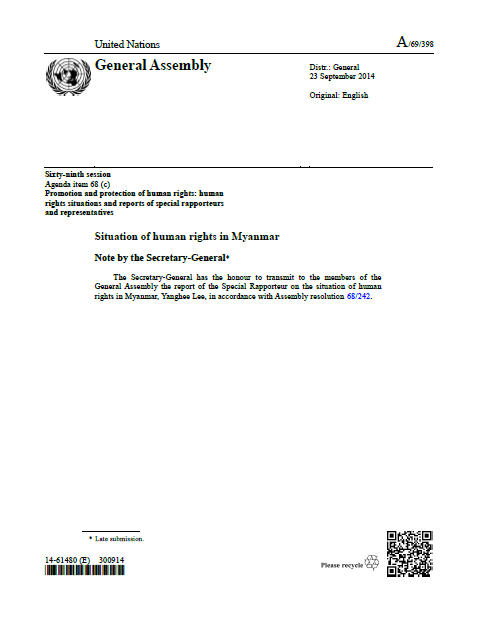Posts Tagged ‘Shan’ (28 found)
“ဘိန္းႏြံတြင္းက ငိုရႈိက္သံ” အစီရင္ခံစာ
၁၈၈၆ တြင္ အထက္ျမန္မာျပည္ကို အဂၤလိပ္တို႔ သိမ္းပိုက္ၿပီးေနာက္ တရုတ္-ျမန္မာနယ္စပ္ တေလ်ာက္တြင္ အေရွ႕ေတာင္အာရွ၌ ဘိန္းစိုက္ပ်ဳိးထုတ္လုပ္မႈ စတင္ ထြန္းကား ရာေဒသ ျဖစ္လာခဲ့ သည္။ ျမန္မာႏိုင္ငံသည္ ၁၉၄၈ ခုႏွစ္တြင္ အဂၤလိပ္တို႔ ထံမွ လြတ္လပ္ေရး ရရွိခဲ့ေသာ္လည္း ရွမ္းျပည္နယ္မွ ဘိန္းစိုက္ပ်ဳိး ထုတ္လုပ္ မႈသည္ အနာဂတ္တြင္ ျပႆနာမ်ားျဖစ္ထြန္းမႈ ပိုမိုႀကီးထြား လာေစသည့္ မ်ဳိးေစ့မ်ားကို ခ်ထားၿပီး ျဖစ္ေနသည္။ […]
• • •Press Release: U.S. Embassy Rangoon’s Ambassador Derek Mitchell’s Visit to Kachin State
Myitkyina – Ambassador Derek Mitchell visited Myitkyina, Kachin State October 25-27. This was Ambassador Mitchell’s third visit to Kachin State as Ambassador; his first visit was in December 2012 and his second visit was in October 2013. During his three day visit, Ambassador Mitchell met with more than 150 members of Kachin society, including religious leaders, local humanitarian workers, cultural historians, students, NGO leaders, political party […]
• • •ဘိန္းႏံြတြင္းမွ ျပည္သူတို႔၏ ငိုရႈိက္သံမ်ားကို တာ၀န္ရွိသူတိုင္းက ၾကားသိကယ္တင္ႏိုင္ရန္
၂၀၀၅ မတိုင္ခင္တြင္ တိုင္းရင္းသား လက္နက္ကိုင္အဖဲြ႔ (၁၇)ဖဲြ႔ႏွင့္ ႏိုင္ငံေတာ္ အစိုးရအၾကား အပစ္အခတ္ရပ္စဲေရး ရယူခဲ့ ၾကေသာ္လည္း န၀တ၊ နအဖ အစိုးရ သည္ ႏိုင္ငံေရးျပႆနာကို ႏိုင္ငံေရးနည္းျဖင့္ မေျဖရွင္းသည့္အျပင္ ျမန္မာ-တရုတ္ နယ္စပ္ တစ္ေလွ်ာက္တြင္ စီးပြားျဖစ္ ဘိန္းစိုက္ပ်ဳိး ထုတ္လုပ္သည္ကို လွစ္လွ်ဴရႈထား ခဲ့ သျဖင့္ ျမန္မာႏိုင္ငံ၏ အေထြေထြ အၾကပ္အတည္း ျပႆနာမ်ားကို သက္ဆိုးရွည္ေစ ခဲ့သည္ဟု ယေန႔ ထုတ္ေ၀သည့္ အစီရင္ခံစာတြင္ ေဖာ္ျပထားပါသည္။ […]
• • •Burmese Government Troops again shell Civilian Area, Commit other Human Rights Abuses in Ke See Township
During October 12-18, 2014, the Burmese government troops continued to commit abuses against civilians during their ongoing offensive against the Shan State Progress Party/Shan State Army (a.k.a Shan State Army-North or SSA-N) in Ke See Township, central Shan State. SHRF has documented the arrest and torture of five villagers, as well as “house arrest” of seven women and girls, including a heavily pregnant woman. On October 13, shells were again fired into a civilian area, damaging housing and killing livestock, and causing over 180 villagers to seek shelter in a local temple […]
• • •UN General Assembly Resolution must Keep the Spotlight on Serious Human Rights Violations
New York, Paris, Bangkok – A UN General Assembly’s Third Committee resolution must continue to address serious human rights violations in Burma, FIDH and its member organization Alternative ASEAN Network on Burma (ALTSEAN-Burma) urged Permanent Missions to the UN during a visit by an FIDH-organized to New-York […]
• • •69th Session of the UN General Assembly – Situation of human rights in Myanmar: Report of the Special Rapporteur on the situation of human rights in Myanmar
I. The mandate of the Special Rapporteur on the situation of human rights in Myanmar was established pursuant to Commission on Human Rights resolution 1992/58 and recently extended by Human Rights Council resolution 25/26. The present report is submitted pursuant to Council resolution 25/26 and General Assembly resolution 68/242.
II. Background
2. Following the completion of the term of the previous mandate holder, the current mandate holder took up her functions only in June 2014, which resulted in a shorter period than usual to conduct a country visit and review the information gathered. The present report therefore sets out the Special Rapporteur’s preliminary observations, to be supplemented by her oral statement to the General Assembly […]
• • •Burma Army Continues to Use the Drugs Trade as a Weapon of War
 A new report by Kachin Women’s Association – Thailand (KWAT), “Silent Offensive: How Burma Army Strategies are Fuelling the Kachin Drug Crisis” outlines the severity of the drug problem in northern Burma as well as the complicity of the government in the trade. The report shows how the government is using opium-growing militia forces in its operations against the Kachin Independence Army (KIA) as part of a deal in which these militias are given free rein to produce and sell heroin and other narcotics.
A new report by Kachin Women’s Association – Thailand (KWAT), “Silent Offensive: How Burma Army Strategies are Fuelling the Kachin Drug Crisis” outlines the severity of the drug problem in northern Burma as well as the complicity of the government in the trade. The report shows how the government is using opium-growing militia forces in its operations against the Kachin Independence Army (KIA) as part of a deal in which these militias are given free rein to produce and sell heroin and other narcotics.
Thus, as the report points out, it is members of either Burma Army controlled Border Guard Forces (BGF) such as the New Democratic Army – Kachin (NDAK), a splinter group of the Kachin Independence Organization (KIO) that became a BGF in 2009, or People’s Militia Forces (PMF) that are heavily involved in offensives against the KIO. Land that is taken by the Burma Army and its proxy forces is then allocated to BGFs/PMFs to utilize however they like. This is often opium cultivation, heroin production and methamphetamine production. To make matters worse these are areas under which the KIO had previously been involved in anti-drug activities but since BGFs or PMFs have taken over, opium cultivation has increased greatly in areas such as Nampaka in northern Shan State and Chipwi in Kachin State […]
• • •Namkham Farmers’ Protest Highlights Urgent Need for Moratorium on Resource Extraction during Peace Process
The anti-mining protest by over 3,000 villagers in Namkham, northern Shan State, on September 5, 2014, highlights the lack of protection against damaging mining, and the urgent need for a moratorium on resource extraction in ethnic areas until there is genuine political reform and peace in Burma […]
• • •Now is the Time to Act, Sexual Violence Must End in Burma
 On 10 June 2014, the Burma government prepared to sign the ‘Declaration of Commitment to End Sexual Violence in Conflict’ at the end of a three-day global summit, which aimed to “shatter the culture of impunity for sexual violence in conflict.” On the same day, a woman was brutally beaten by a Burma Army soldier during an attempted rape in Rezua, Chin State. The eyewitnesses who spoke to the Chin Human Rights Organization said that the women was held down by the soldier, while he repeatedly beat her. She was rushed to the hospital and is fortunately now in recovery.
On 10 June 2014, the Burma government prepared to sign the ‘Declaration of Commitment to End Sexual Violence in Conflict’ at the end of a three-day global summit, which aimed to “shatter the culture of impunity for sexual violence in conflict.” On the same day, a woman was brutally beaten by a Burma Army soldier during an attempted rape in Rezua, Chin State. The eyewitnesses who spoke to the Chin Human Rights Organization said that the women was held down by the soldier, while he repeatedly beat her. She was rushed to the hospital and is fortunately now in recovery.
However, this brutal event has lead to a series of demonstrations in Rezua and Matupi, Chin State this week, calling for an end to sexual violence. According to The Irrawaddy, protesters held placards that stated: “Stop raping; We are humans, not animals. We are humans, not property.” Though the organizers requested to hold the rally, the local police denied their applications and they have been arrested for staging a peaceful demonstration without permission, ironically under the Peaceful Assembly and Peaceful Procession Law.
This recent case of attempted rape is not a one-off incident of a rogue Burma Army soldier. A report produced by Women’s League of Burma (WLB) ‘Same Patterns, Same Impunity’ demonstrates how the sexual violence inflicted by the Burma Army soldiers are systematic in nature and a part of a wider structural system of politicizing women’s bodies and abusing them as instruments of war and oppression. The data collected by WLB and its members found that since the 2010 elections, over 100 cases of rape has been documented, of which 47 were brutal gang rapes and victims were as young as eight years old. Most of the documented cases were linked to Kachin and Northern Shan State where military offensives have been taking place since 2011, indicating that rape and sexual violence is in fact, used as a weapon in an attempt to demoralize the ethnic communities and to assert dominance over them […]
• • •












 All posts
All posts